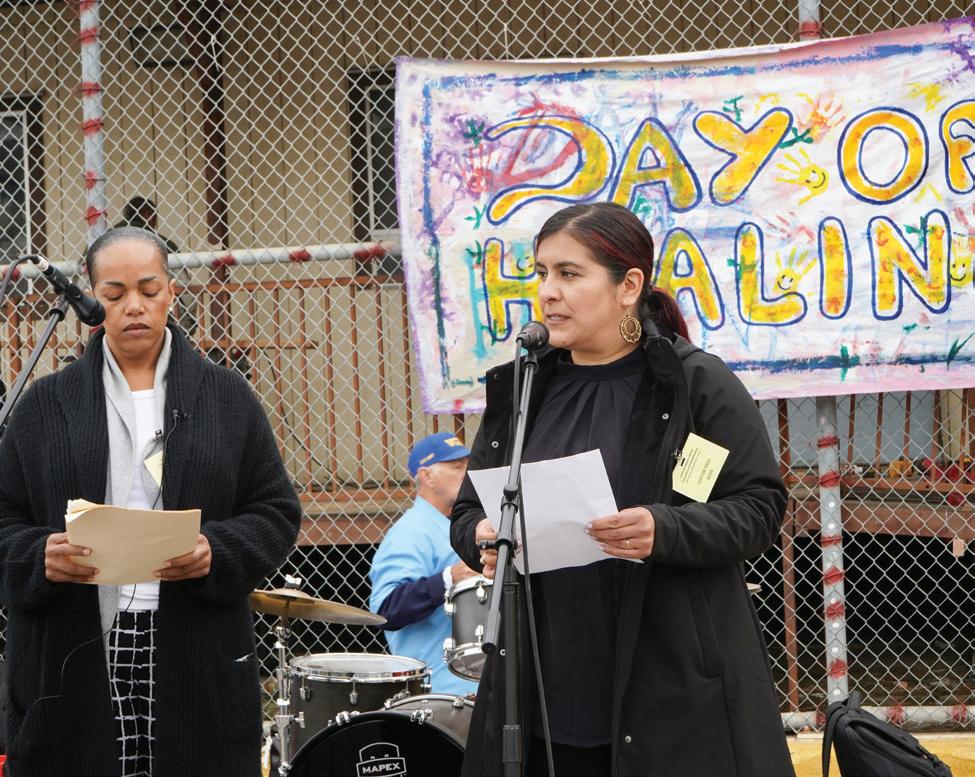
Este mes de abril se llevó acabo por tercer año consecutivo la celebración del Día a la Conciencia para los Sobrevivientes en el Centro de Rehabilitación de San Quentin.
Un grupo de diecisiete sobrevivientes conformado por mujeres y hombres, que se presentaron para dar testimonio de cómo la violencia ha perturbado la vida de cada una de estas personas.
“Yo comparto mi historia para empoderar a la gente ― para que sepan que su siguiente decisión pueda ser la de sanar… previniendo que la siguiente persona pueda experimentar lo que yo siento. Gracias a ustedes por ser un ejemplo de sanación”, dijo directora ejecutiva de Seguridad y Justicia en California, Tanisha Hollins.
En el evento, los invitados acompañados de personas encarceladas y miembros de la administración de SQ, hicieron un circulo de sanación para después reunirse en campo y dar una vuelta con pancartas en español e inglés con mensajes como stop to violence (cese a la violencia), peace (paz), hope (esperanza), empathy (empatía), entre otros.
Los encarcelados tuvieron la oportunidad de hablar ante los invitados, sobre las experiencias del cambio a su comportamiento, pensamiento de negación, tomando responsabilidad de sus acciones pasadas y honrando a sus sobreviertes por el impacto causado.

“No es de forzar el perdón, más bien es de informar de los traumas que pueden ayudar a moldear la manera en que pensamos. Reconociendo a los sobrevivientes, víctimas y otros grupos de recuperación presentes. Apoyando a la gente a ser completos otra vez”, dijo Kareema Baptist de la Unidad de Victimas de la Oficina de Fiscal de San Francisco.
El Director de SQ C. Andes., la Teniente G. Berry y el Segundo Jefe E. Patao., junto con la asesora Amanda Weitman y el invitado Mick Garden, quienes reconocieron el trabajo de concientización de los reos, por el impacto hacia sus víctimas y familiares.
“Mis enmiendas en vida ― es de hacerme responsable en este espacio al decir lo siento”, dijo el residente de SQ, Floyd Collins.
Garden comentó a todos los presentes, que hay que honrar y respetar a todos los que fueron dañados por la violencia, además hizo un llamado a unirse a la lucha y que no quede en palabras, también agregó diciendo “lo que tenemos hoy, podemos dárselo a otra gente en la comunidad, quienes siguen destrozados en sus vidas”.
Sol Mercado habló, que durante su encarcelamiento aprendió herramientas de los cuales hizo que tuviera un compromiso ante la comunidad, y en el cual lo ha llevado a dar prueba de su enmienda.
“Al tratar mis traumas, he aprendido que mis detonantes son verdaderos. Hoy en la comunidad, educo a la gente sobre lo que es el trauma”, agregó Mercado.
Para algunos residentes de SQ, escuchar los dolorosos testimonios de los sobrevivientes, han permitido reflexionar sobre las decisiones que tomaron, y llegar hasta donde están el día de hoy.
“Es realmente duro escuchar de las verdaderas víctimas, acerca [del impacto] de los asesinatos ocurridos en sus vidas. Yo soy responsable por una y me siento horrible… los efectos son vastos, profundos y tristes”, dijo el reo Michael Thompson. “El perdonarme a mí mismo, me ayudo a seguir adelante y tomar responsabilidad de mi crimen.”
Healing Day: When Survivors Speak Out, Change Happens
This April, Survivors Awareness Day was held for the third consecutive year at the San Quentin Rehabilitation Center.
A group of seventeen survivors, both women and men, came forward to bear witness to how violence has disrupted each of their lives.
“I share my story to empower people—so they know their next decision can be to heal… preventing the next person from experiencing what I felt. Thank you for being an example of healing,” said Tanisha Hollins, Executive Director of Safety and Justice in California.
At the event, guests, accompanied by incarcerated individuals and members of the SQ administration, formed a healing circle and then gathered on the field to walk around with signs in Spanish and English with messages such as “stop violence,” “peace,” “hope,” “empathy,” and others.
Incarcerated individuals had the opportunity to speak to the guests about their experiences of changing their behavior, denial, taking responsibility for their past actions, and honoring their survivors for the impact they caused.
“It’s not about forcing forgiveness, but rather about reporting traumas that can help shape the way we think. Acknowledging survivors, victims, and other recovery groups present. Supporting people to become whole again,” said Kareema Baptist of the San Francisco District Attorney’s Office Victims’ Unit.
SQ Director C. Andes, Lieutenant G. Berry, and Assistant Chief E. Patao, along with advisor Amanda Weitman and guest Mick Garden, recognized the residents’ work in raising awareness about the impact on their victims and their families.
“My life’s atonement—it’s taking responsibility in this space to say I’m sorry,” said SQ resident Floyd Collins.
Garden told everyone present that we must honor and respect all those harmed by violence. He also called on everyone to join the fight and not leave it as mere words. He added, “What we have today, we can give to other people in the community who are still devastated in their lives.”
Sol Mercado said that during his incarceration, he learned tools that made him commit to the community, and that has led him to demonstrate his atonement.
“By dealing with my traumas, I’ve learned that my triggers are real. Today, in the community, I educate people about what trauma is,” Mercado added.
For some SQ residents, hearing the painful testimonies of survivors has allowed them to reflect on the decisions they made and get to where they are today.
“It’s really hard to hear from the real victims about the impact of the murders on their lives. I’m responsible for one, and I feel horrible… the effects are vast, profound, and sad,” said resident Michael Thompson. “Forgiving myself helped me move forward and take responsibility for my crime.”